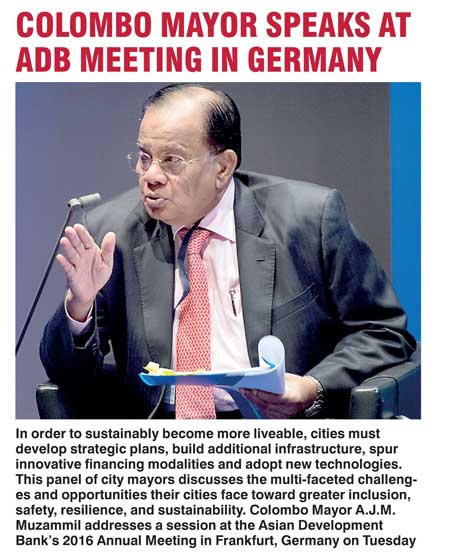Saturday Feb 21, 2026
Saturday Feb 21, 2026
Friday, 6 May 2016 00:00 - - {{hitsCtrl.values.hits}}
By Andrew McIntyre
http://blogs.adb.org: The relatively new cities of Frankfurt and Yokohama are both excellent examples of what a succession of dedicated and dynamic city mayors can achieve when they engage closely with local communities and businesses, and maintain a strong and innovative vision for the future.
Frankfurt, which hosts this year’s ADB Annual Meeting, and Yokohama, where the event will take place in 2017, are now global hallmarks of what it means to be green, competitive and inclusive – ensuring livability is sustained over the long term.
With the fastest-growing urban population in the world, rising by 29% over the past 2 decades, Asia is facing a unique urban challenge. By 2050, urban areas will account for about 65% of Asia’s total population, which itself is expected to almost double to 3.3 billion people. While this presents opportunities for higher productivity and better living standards, there are risks: 523 million Asians already live in squalid urban slums with poor services; severe living condition disparities in many cities undermine social cohesion; and urban buildings and transport account for significant energy consumption and carbon emissions.
We need more integrated urban planning, focusing on managing urban sprawl, and providing sustainable and affordable infrastructure and basic services. The overall quality and efficiency of Asian cities will determine the region’s long-term productivity and stability. Maintaining vital economic growth, while creating livable cities for all, is one of the biggest challenges for our region.
To strengthen urban resilience, in particular, Asian cities need knowledge, investment, and collaboration among all development partners – both public and private. Ensuring that citizens play an integral role in urban development may be the most difficult challenge of all.
Mayors are at the nexus of the city dynamic. They are strategically placed between the wider economic and political imperatives, but closest to the streets, schools, and businesses of the city space. They are their city’s political representatives yet, day to day, experience the same needs and issues of the citizens they represent. Often the most passionate advocates of city needs to all outsiders, mayors can be the harshest taskmasters when seeking progress, even in the absence of central Government support. Their needs are great, their resources are often few; nevertheless, mayors, their staff, citizens and businesses together have the potential to make a city more livable, more smart and sustainable – and become the city for the future.
In close collaboration with our city and country partners, ADB has initiated a number of programs to help mayors address the vast challenges and opportunities their cities face.
The Cities Development Initiative for Asia (CDIA), established in 2007 by ADB and the Government of Germany with core funding from the governments of Austria, Sweden, Switzerland, and the Shanghai Municipal Government, has an annual budget of over $7 million and provides assistance to cities to bridge the gap between development plans and implementation of infrastructure investments. A good example is the Georgian capital of Tbilisi, where CDIA is helping draw up pre-feasibility studies to help the city explore new technical and financing approaches to shift to more sustainable transport.
Another example is ADB’s Urban Climate Change Resilience Trust Fund (UCCRTF) - a new $160 million multi-donor trust fund established under the Urban Financing Partnership Facility. It helps cities prepare and finance infrastructure to boost climate resilience, especially among the highly vulnerable urban poor. In Mandalay, Myanmar, ADB is implementing a $4.0 million UCCRTF grant to improve the city’s resilience planning capacity, upgrade solid waste management, and address urban ecological issues.
Finally, our new flagship Future Cities Program is working closely with selected cities across Asia to coordinate technical assistance, knowledge and research, and provide sustained financial support as they work to become the livable cities of the future. This program views mayors as the key drivers and facilitators of change, as well as the active voice of city communities and businesses.
Mayors from our partner cities and knowledge partners will discuss this week in Frankfurt the competing challenges and opportunities their cities face to becoming inclusive, safe, resilient, and sustainable.
(Andrew McIntyre manages ADB’s Future Cities Program, which is exploring innovative approaches to engage with cities and support urban operations though relevant ‘Finance ++’ initiatives.)